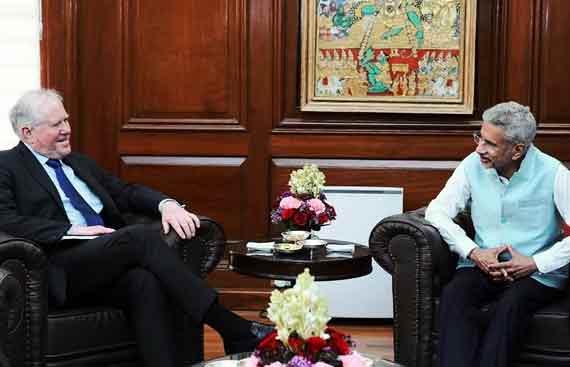India-US to Sign an Air Information Sharing Agreement for the Fifth Time

India and the US are all set to sign an Information Sharing Agreement, aimed at producing jet engines in India.
India and the United States are all set to finalize an air information sharing agreement post the meeting between Frank Kendall, the US Secretary of Air Force, Indian External Affairs Minister S Jaishankar, and Defense Secretary Giridhar Armane.
Mr. Kendall expressed his interest in withholding additional pacts, like the air information sharing agreement, to enable a cooperative working relationship between the two nations. He added that India is undoubtedly a major and valuable defense partner to the United States, where both regions are sharing their values for extended diplomacy between the nations.
The defense cooperation between India and the US is likely to soar for two decades, owing to their cooperative measures, especially in tackling global political conflicts. India has signed nearly four foundational information-sharing agreements with the US: the General Security of Military Information Agreement (GSOMIA) in 2002, the Logistics Exchange Memorandum of Agreement (LEMOA) in 2016, the Communications, Capability, and Security Arrangement (COMCASA) in 2018, and the Basic Exchange and Cooperation Agreement for Geospatial Cooperation (BECA) in 2020.
Both India and the US have been cooperating under bilateral initiatives like the Defense Technology and Trade Initiative (DTII) since 2012, and the Initiative on Critical and Emerging Technologies (iCET). The DTII focuses on the co-development and co-production of high-tech weapons systems, and the iCET is undoubtedly a broader initiative, involving varied horizons from semiconductors and advanced telecom to artificial intelligence and its applications for the warfare scenario.
Mr. Kendall's visit is critical because it comes just two months after the inauguration of the iCET in Washington, which was led by the two countries' National Security Advisors. Alongside this, both nations are aiming to sign a pact on transferring jet engine technology, facilitating India's ability to manufacture jet engines. Indian insistence on upholding a large share of products that are manufactured in India ought to be performed in varied stages. These initiatives and further defense cooperation between the two nations are likely to lift sanctions on India under the US Munitions List and the International Traffic in Arms Regulations.
